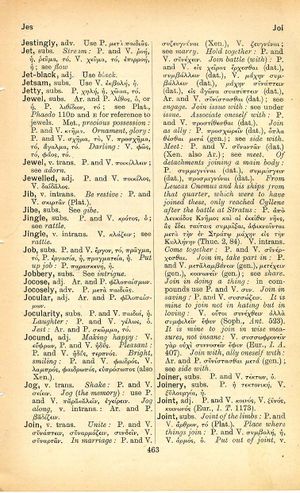join
Ὁ δὲ μὴ δυνάμενος κοινωνεῖν ἢ μηδὲν δεόμενος δι' αὐτάρκειαν οὐθὲν μέρος πόλεως, ὥστε ἢ θηρίον ἢ θεός → Whoever is incapable of associating, or has no need to because of self-sufficiency, is no part of a state; so he is either a beast or a god
English > Greek (Woodhouse)
v. trans.
Unite: P. and V. συνάπτειν, συναρμόζειν, συνδεῖν, V. συναρτᾶν. In marriage: P. and V. συζευγνύναι (Xen.), V. ζευγνύναι; see marry. Hold together: P. and V. συνέχειν. Join battle (with): P. and V. εἰς χεῖρας ἔρχεσθαι (dat.). συμβάλλειν (dat.), V. μάχην συμβάλλειν (dat.), μάχην συνάπτειν (dat.), εἰς ἀγῶνα συμπίπτειν (dat.), Ar. and V. συνίστασθαι (dat.); see engage. Join issue with: see under issue. Associate oneself with: P. and V. προστίθεσθαι (dat.). Join as ally: P. προσχωρεῖν (dat.), ὅπλα θέσθαι μετά (gen.); see side with. Meet: P. and V. συναντᾶν (dat.) (Xen. also Ar.); meet. Of detachments joining a main body: P. συμμιγνύναι (dat.), συμμίσγειν (dat.), προσμιγνύναι (dat.). From Leucas Cnemus and his ships from that quarter, which were to have joined these, only reached Cyllene after the battle at Stratus: P. ἀπὸ Λευκάδος Κνῆμος καὶ αἱ ἐκεῖθεν νῆες, ἃς ἔδει ταύταις συμμῖξαι, ἀφικνοῦνται μετὰ τὴν ἐν Στράτῳ μάχην εἰς τὴν Κυλλήνην (Thuc. 2, 84). V. intrans. Come together: P. and V. συνέρχεσθαι. Join in, take part in: P. and V. μεταλαμβάνειν (gen.), μετέχειν (gen.), κοινωνεῖν (gen.); see share. Join in doing a thing: in compounds use P. and V. συν. Join in saving: P. and V. συσσώζειν. It is mine to join not in hating but in loving: V. οὔτοι συνέχθειν ἀλλὰ συμφιλεῖν ἔφυν (Soph., Ant. 523). It is mine to join in wise measures, not insane: V. συσσωφρονεῖν γὰρ οὐχὶ συννοσεῖν ἔφυν (Eur., I.A. 407). Join with, ally oneself with: Ar. and P. συνίστασθαι μετά (gen.); see side with.

